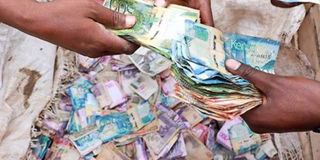Shilling plunges to record low as coronavirus takes toll

Traders at the Muthurwa market in Nairobi counting money on March 19, 2020 after the day’s sale. The Kenyan shilling exchanged at a record low of Sh109.3 against the US dollar on Thursday, sliding past the worst record of October 2011. PHOTO | DENNIS ONSONGO | NATION MEDIA GROUP
What you need to know:
- Stanbic Bank was selling the greenback at Sh109.38 at midday Thursday while Co-operative Bank was selling at Sh107.85, Equity Bank (Sh107.45) and GT Bank (Sh107).
- This unnerved an already shaky forex market that is still trying to deal with the uncertainty over the economic fallout from Covid-19.
- On average, the mean exchange rate for the dollar was Sh104.2 on Wednesday.
The Kenyan shilling has taken a major hit from the coronavirus pandemic. In Thursday’s trading, it exchanged at a record low of Sh109.3 against the dollar, sliding past the worst record of October 2011.
A spot check by the Nation showed that most commercial banks in Nairobi’s city centre were buying the dollar at an average of Sh98 and selling it at Sh107 and more in what has sent the local currency tumbling past its worst performance in the past decade.
Stanbic Bank was selling the greenback at Sh109.38 at midday Thursday while Co-operative Bank was selling at Sh107.85, Equity Bank (Sh107.45) and GT Bank (Sh107).
Currency dealers said the demand for the greenback was triggered by the Central Bank of Kenya (CBK), which has been actively buying dollars, worth Sh40 billion, from the Kenyan market to build its war-chest when the worst comes.
DEMAND AND SUPPLY
This unnerved an already shaky forex market that is still trying to deal with the uncertainty over the economic fallout from Covid-19.
“Most of the demand is coming from the CBK and the law of demand and supply is what has seen the Kenyan shilling weaken,” a currency dealer at a bank on Kimathi Street, who sought anonymity, told the Nation.
As part of measures to deal with speculation, CBK Governor Patrick Njoroge has been running roughshod over currency dealers who were talking to journalists about the performance of the currency on the record. Today, many currency dealers only agree to speak on the condition of anonymity for fear of reprisals.
On average, the mean exchange rate for the dollar was Sh104.2 on Wednesday.
This is the second week the shilling is losing ground against the US dollar after Kenya confirmed its first case of the novel coronavirus.
The weakening of the shilling promises to increase the cost of imports, given that importers now will need more shillings to buy the same quantities of goods than before.
The CBK announced that it would be buying Sh40 billion ($400 million) between March and June this year, or Sh1 billion per month, seen as an extra buffer to protect the country against shocks should things escalate too fast.
A weak shilling is bad for the Kenyan economy since it is a net importer. Kenya pays for most of its imports, among them oil and machines, using the dollar. Most of the debts are also dollar-denominated and this means that Kenya will be paying more than initially budgeted for on account of forex exchange losses.
PILE PRESSURE
This comes at a time when the private sector continues to pile pressure on the government to provide some incentives to protect jobs.
The Kenya Association of Manufacturers (KAM) said some of the measures the government can consider include halving relevant taxes for small and medium enterprises (SMEs), including VAT from 16 per cent to 8 per cent. KAM also wants corporate taxes to be slashed from 30 per cent to 15 per cent for the next six months while the government should also consider zero-rating VAT on essentials including soap, tissue, sanitisers and staple foods for the next six months.
The other measure is fast-tracking further purchase of medical supplies by releasing a stimulus package or funds for local manufacturing of pharmaceuticals.
“Additionally, increase Kenya Medical Supplies Authority storage facilities where locally manufactured and imported molecules, which are not locally available, are stored to ensure adequacy during Covid-19 crisis,” KAM said in a statement.
The association notes that due to the expected shortage of imported finished goods, the government should gazette and enforce a list of locally manufactured goods. “The government should fast-track the finalisation of Local Content Guidelines and the approval of the Local Content Policy.
PUBLIC GATHERINGS
Additionally, the government needs to expand the scope of the Local Content Bill 2018 to feature all sectors within manufacturing,” it says.
KAM said the effects of the Covid-19 lockdowns are taking a toll on supply and value chains, manufacturing, airlines, ports, international trade, investment decisions, movement of goods and services, capital and labour, among others.
The lobby added that the impact is also being felt in Kenya due to the slowdown of economic activities as workers are encouraged to isolate themselves from mainstream activities that can be avoided.
Additionally, the government suspended public gatherings for the next 30 days, closed schools and suspended all travel for all persons coming into Kenya from any country with reported Covid-19 cases.
“The government has a responsibility to ensure the sustainability of the enterprises through developmental and bailout measures whenever a force majeure case as Covid-19 hits the businesses,” KAM adds.





